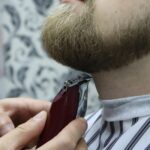The subject of shaving and hair growth has been a hotly debated topic for generations. Many believe that frequent shaving causes hair to grow back thicker and faster. But is this really the case?
The origin of the myth: shaving makes hair thicker
A widespread assumption is that regular shaving makes hair thicker and stronger. But where does this myth actually come from?
The explanation could lie in perception. When you shave a hair, it is cut off right at the surface of the skin. The tip of the hair was previously thinner and finer. Now it becomes dull. When the hair starts to grow again, it often appears thicker. This stubbly effect occurs because the hair is always slightly wider at its base than at the tip.
Shaving doesn’t change the thickness of the hair, it just changes the way it looks and feels when it grows back.
Does shaving affect hair growth?
One of the most frequently asked questions is: “Does shaving accelerate hair growth?” The clear answer is: No, shaving does not accelerate hair growth.
Hair growth is regulated by the hair follicles under the skin. These are influenced by factors such as genes, hormones and health. Shaving has no influence on this. The speed at which your hair grows is not determined by the frequency of shaving. It depends on biological factors. These include your testosterone level, blood flow to the scalp and diet.
Why does hair often feel thicker after shaving?
The question of why hair often feels thicker or stubbier after shaving is easy to answer. When hair is cut razor sharp, the thin, tapered tip is removed. The hair base that is left behind, which is thicker, gives the feeling that the hair is thicker and rougher overall. However, it is important to understand that shaving does not actually change the hair texture.
It is merely an optical and tactile illusion. As soon as the hair has reached a certain length and the tip becomes thinner again, this effect disappears.
Hair growth: what really influences it?
If shaving doesn’t affect hair growth, what does? Various factors play a role here:
Genetics: Genes determine how fast and thick our hair grows. This explains why some people have thicker hair than others.
Hormones: Testosterone in particular influences hair growth. This also explains why men often have more body hair than women.
Nutrition: A balanced diet, rich in vitamins and minerals such as biotin, zinc and iron, promotes hair growth.
Circulation: Good blood circulation to the scalp and hair follicles also supports hair growth.
Age: With increasing age, the hair growth cycle slows down and hair can become thinner.
Shaving versus other hair removal methods
The question often arises as to whether other hair removal methods have a different effect on hair growth than shaving. Methods such as waxing, epilating or laser hair removal are possible alternatives.
Waxing and epilating remove the hair at the root. This means that it takes longer for them to grow back. However, these methods also do not change the thickness or speed of hair growth. However, many people report that the hair grows back finer after many years of waxing or epilating. This is because the hair often grows back weaker after being pulled out.
Laser hair removal is another option that can have a longer-lasting effect on hair growth. Here, the hair follicle is damaged by laser beams, which reduces or stops hair growth in the long term.
The hair cycle: a look at the science
To understand why shaving does not affect hair growth, it helps to look at the hair cycle. This consists of three phases:
Anagen phase (growth phase): The hair grows during this phase. This phase can last between two and seven years, depending on genetic predisposition.
Catagen phase (transition phase): This phase lasts about two weeks, during which hair growth stops and the hair follicles prepare for the resting phase.
Telogen phase (resting phase): During this phase, the old hair falls out and the new hair begins to grow. This phase lasts around three to four months.
Shaving does not affect this cycle. The hair follicle is anchored in the skin and remains unaffected by external influences such as shaving.
Shaving does not affect hair growth
The idea that frequent shaving makes hair grow thicker and faster is a myth. Scientifically speaking, shaving has no effect on the thickness, density or speed of hair growth. The optical illusion that hair appears thicker after shaving is due to the blunt tip of the hair. This tip is created when the hair is cut off at the surface of the skin.
Hair growth is primarily determined by genetic and hormonal factors. If you really want to promote hair growth, you should focus on a healthy lifestyle, proper hair care and, if necessary, medical treatments.
Frequent shaving may affect the appearance of the hair, but the biological basis of hair growth remains unaffected.

